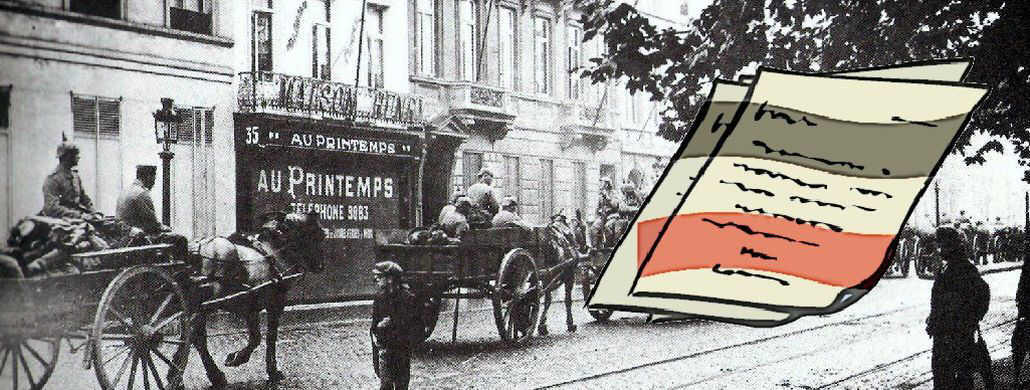
[Rhineland and Belgium, 1914] On August 2, Germany troops crossed the border into Luxemburg, on August 4, the border into Belgium. Soon a large part of Belgium and the northeastern part of France were occupied.
Every victory message was cheered: August 9 Liege, August 20 Brussels, August 25 Namur. All this sounded triumphant, as if the enemies would soon be put down and Germany would win the war. Still, the Bonn newspapers were enthusiastic about the large number of volunteers. Hundreds and thousands went to the front to fight for the fatherland. The newspapers published warnings to “our warriors on the western front”, such as ambushes in French houses, trap doors in basements, things hidden behind walls and absinthe bottles. All this should prove the “perfidious nature of the French”.
“Home front”
Matthias had been away for a few weeks. Lottie also tried to persuade herself that the war would soon be over, but deep down, she did not believe it. She was glad that she had full days from early in the morning to late at night. In her letters to Matthias, she did her best to sound confident.
“Here at home, everyone is doing what they can,” she wrote. “It is all well organized, so help quickly gets to where it is most needed. Many volunteers are helping with the soup kitchens, providing one or more meals a day for people in need. We’re running a soup-kitchen in the ‘Stübchen’ too, and Susan is still managing to cook a halfway nutritious dish from almost nothing. Kathi and Walter are helping by ladling the soup or the stew and handing bread to the guests.
The soup-kitchen are also information centers. Jacob is giving encouragement and information as best he can. A lot of letters keep arriving at the ‘Stübchen’, and Kathi is delivering them in the villages around. So far old Mr. Schulz is driving her, but soon she will get an emergency driver’s license herself.
“Come home safely”
Little Walter is a big help on the vineyard. We are now growing all sorts of vegetables on every free sport of soil, above all potatoes. Moreover, he is helping at the collection point to pack the gifts for the soldiers: tobacco, bags for cigarettes, matches, chocolate, gingerbread, hard smoked sausage, woolen stockings, pulse warmers, ear protectors, stationery and whatever we can find for you out there at the front. All these gifts are then loaded onto motor vehicles and brought to Aachen, from there they are transported to the front. After school, Walter is helping loading the cars. That’s a man’s work’, the little fellow has told the ladies of the Help Committee. My darling, you would be immensely proud of our children. Come home safely.”
German advance halted at the Marne
The German troops occupied a large part of Belgium and the North East of France and hoped for a quick victory. But in the Battle of the Marne (September 6-9, 1914), French and British forces stopped the invading German army. The Germans were utterly exhausted, and their military leaders had underestimated the spirit of the French troops.
A grueling war of attrition began. Millions of strained and exhausted soldiers on both sides dug into trenches. Most military leaders believed in offensives and ordered frontal assaults, yet machine guns and rapid-firing artillery, used in combination with trenches and barbed wire emplacements gave a crucial advantage to the defense. Huge numbers of soldiers were killed in frontal assaults.
At first, Matthias’s letters had been cautiously confident. After the battle of the Marne, they seemed Matthias’ [] Out of consideration for his family, he did not go into details, yet Lottie could sense his thoughts.
Trenches
“We have entrenched ourselves. Artillery fire for hours, many wounded and dead. You always hear their screams, and you would like so much to help, but that would be certain death, and you can only lie down on the ground and pray that it will soon be over. Only the thought of you gives me strength.”
Reports of casualties came in, reserve troops moved up. At the end of September, the news of August Macke’s death reached Bonn. The first wounded from the western theater of war arrived and were well cared for in the military hospitals. Lazarets had been set up in hotels and large houses, also in the hotel on the Petersberg and in Bonn’s Beethovenhalle.
Rape of Belgium
The violation of Belgium’s neutrality triggered Britain’s declaration of war on Germany. Soon terrifying reports of the brutal actions by the Germans spread. Fearing irregular fighters, the Franc-tireurs, the German troops had killed thousands of civilians. In the old university town of Leuven, they had killed more than 200 people and deliberately set the university library on fire. Large parts of Belgium were devastated, one and a half million Belgians were on the run, and more than 100,000 Belgians were forced to work for the German army. One spoke of the “Rape of Belgium”. British newspapers published stories on German atrocities, propaganda posters about Germans raging “like the Huns” appeared.
Eastern Front
According to Germany’s war strategy, the bulk of the troops were marching through Belgium and Luxemburg against France. Confident that they could defeat France while Russia was still mobilizing its troops, the German High Command had deployed only two armies to defend Germany’s Eastern border.
But already in the middle of August, two Russians armies invaded East Prussia and defeated German troops at Gumbinnen on August 20. The commanding general considered retreat.
Now the Chief of the General Staff Helmuth von Moltke appointed General Field Marshal Paul von Hindenburg as commander on the Eastern front with Erich Ludendorff as his staff-officer, the latter had just led the German troops at Liege in Belgium.
Hindenburg – a national hero
The Russians failed to encode their radio messages, so Hindenburg and Ludendorff knew about their plans. On August 26, they attacked the Russian second army by surprise near the village of Tannenberg. After three days of battle, the Russians had lost almost the entire Second Army, its commanding general shot himself. A bit later, in September at the Masurian Lakes, Hindenburg and Ludendorff defeated the First Russian Army as well.
The “Battle of Tannenberg”, as Hindenburg named it in vengeful remembrance of the village where in 1410 the Poles had defeated the Teutonic Knights, was a great victory for the German troops, and it brought high prestige to Hindenburg and Ludendorff. Particularly Hindenburg became a national hero.
Austria-Hungary’s disaster
The Austrian-Hungarian army, however, suffered terrible losses. Their campaign to conquer Serbia ended in disaster, in Galicia the gigantic Russian army overran them, conquered the capital Lemberg and besieged the fortress of Przemysl.
Joscha Csbany was shaken. “Our army hast lost almost 1,3 million,” he wrote, “I hear and read it, yet everything in me struggles to suppress it is too hard to bear. So many men have been killed. Among them many officers, now we have hardly anyone left who could lead our multinational troops Thousands have been taken prisoners by the Russians. Russia is gigantic – who knows where they are, and if we ever will see them again.”
For Papa too it is a heavy blow, he served in Galicia and Mama visited him. Now the Russians are there. We often talk on the phone, he is staying with friends and well taken care of. He is incredible. My boy, you just have to believe that we will make it through all these hardships, he keeps telling me. If you mother and I had lost hope back then, you and your sister would not walk the earth today.”
U.S. neutrality
When World War I erupted in Europe, President Woodrow Wilson pledged neutrality for the United States. “The United States must be neutral in fact as well as in name during these days that are to try men’s souls. We must be impartial in thought as well as in action, must put a curb upon our sentiments as well as upon every transaction that might be construed as a preference of one party to the struggle before another,” the President reminded his fellow Americans.
And many of them wanted the United States to stay out of the conflict. Many Americans personally sympathized with Britain and France, over a hundred thousand Americans volunteered for war. American institutions lent large sums to the Allied governments. Irish-Americans, however, did not approve of the support for Britain, they hoped Ireland could finally obtain its independence from a weakened Britain. Most German Americans hoped that the United States would remain neutral, and would not send any war material to the allies.
Help for Belgium
When the news about the “Rape of Belgium” spread, many people were appalled and wanted to help. The German occupiers requisitioned what they needed, although the Belgians suffered hunger and faced starvation unless a lot of food were brought in fast. Herbert Hoover (the later US president), founded the Commission for Relief in Belgium. With private donations and government grants an $11-million-a-month budget came together. It was an unprecedented relief effort to feed the entire Belgian nation during the war.
German-Americans
For many German-Americans a hard time began. Most of them didn’t want American arms to be delivered to Europe, they hoped that America would remain neutral, and that their fellow Americans would not turn against them for having German roots. There had been news about growing suspicion against German Canadians now that Canada and Australia, British dominions, fought on Great Britain’s side.
So did Chiara. The newspapers reported about the German victory at Tannenberg. “So General Field Marshal Hindenburg is a national hero”, she thought, “apparently the generals have taken over.” Thank God, America would remain neutral.
Her thoughts wandered to Germany. She had received a short letter from Lottie telling her about Sophie’s death, and Matthias being drafted to the front, and that Étienne and Hans were missing. She had not heard from her since. And Chiara had the foreboding that it would be the last one for years.

Be the first to comment